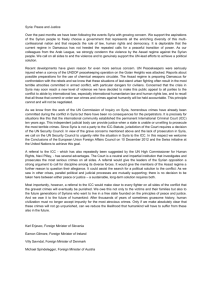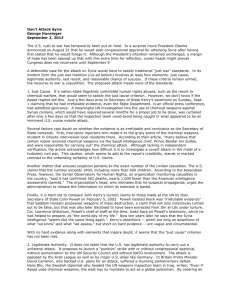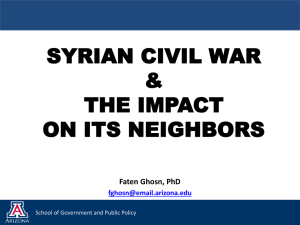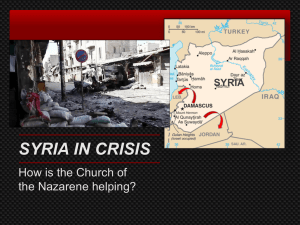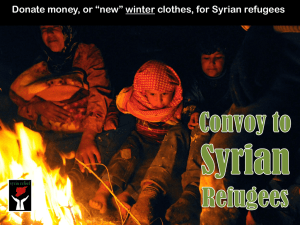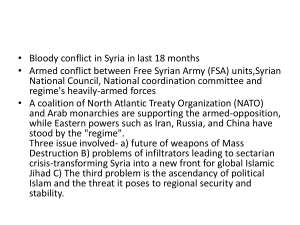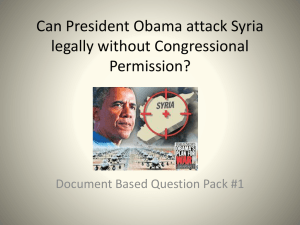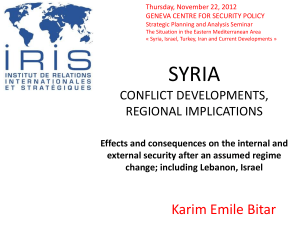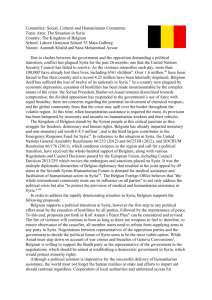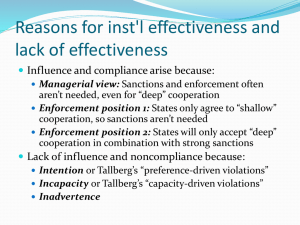Syria - Paul Bacon
advertisement
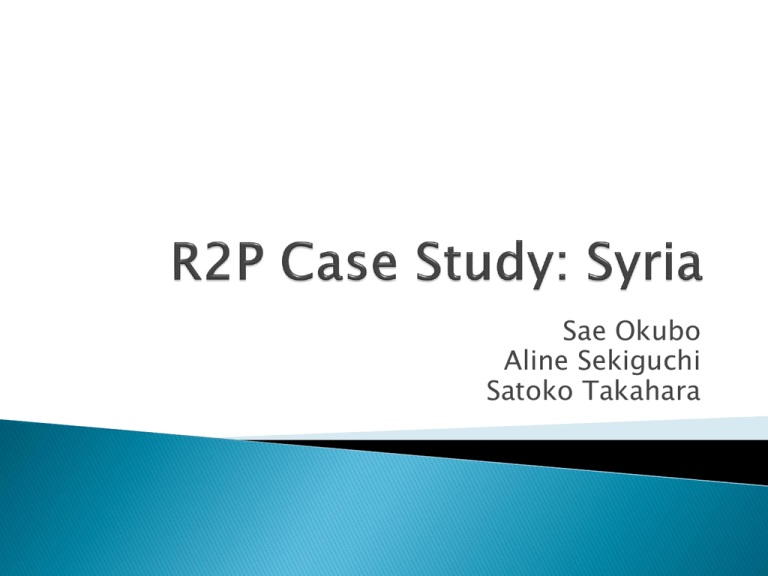
Sae Okubo Aline Sekiguchi Satoko Takahara Background General timeline of the conflict UN Resolutions and actions taken by the international community R2P Criteria Syria Now Son of Hafez al-Assad Took over presidency in June of 2000 Belongs to the minority Alawite sect of the population en.wikipedia.org Division within the Syrian population: ◦ 65% Sunni Arabs ◦ 12% Alawis(Alawite) ◦ 10% Christians ◦ 9% Kurds Issue of having a secular government http://eastchapelhillobserver.com March: The protests begin May: Government’s military crackdown by the army ➝ Shabiha July: Free Syrian Army (FSA) formed by this point ◦ Government focuses on protests in Hama August: Western leaders explicitly call for Assad to step down November: the Arab League suspends Syria’s membership April: UN brokers ceasefire, sends monitors June: UN suspends its mission in Syria August: UN accuses the Syrian government of war crimes September: Rebels accused of crimes against humanity December: The US also formally recognizes Syria’s opposition National Coalition as the legitimate representative of the Syrian people January: 65 bodies found in Aleppo, shot execution style April: Syria accused of using chemical weapons May: EU lifts the arms embargo www.un.org June: US officials announce that Assad used chemical weapons August: Syrian government accused of using chemical weapons ◦ UN inspectors go to Damascus ◦ Obama considers a limited military strike against Syria September ◦ Russia proposes for Syria to give up its chemical arms ◦ UN finds ‘convincing evidence’ of chemical attack The international community has had a difficult time deciding what actions to take because of the complexity of the situation ➝ Al-Qaeda linked groups aligning with the opposition etc. Possibility of ethnic cleansing after the war Escalating sectarian violence 1st phase: Criticism and Economic sanction 2011. 4~ U.S. & EU → asset freeze & prohibition on entry further pressure by EU ← & Turkey & LAS BAN on oil embargo & trading halts Resulted in afflicting local people rather than exhausting the regime 1st draft resolution condemning Syria was rejected by the veto of Russia and China 2nd phase: League of Arab States (LAS) Response 2011. 11 decided to suspend Syria and impose sanctions 2011. 12 Syria agreed to LAS initiative to allow observers 2012. 1 LAS suspended its mission due to worsening violence in Syria 3rd phase: UN Security Council Resolutions 2012. 2 draft resolution urged Syria to accept non-binding peace plan →fell short of formal resolution 2012. 4 #2042, #2043 →Deployment of 30 military observers to Syria →Deployment of UNSMIS (300 civil observers) 2012. 6 Geneva 1 laid out a peace plan for Syria together with LAS and UN members →called for a Syrian-led political transition 2012. 7 #2059 →extended UNSMIS for a final period of 30 days 2012. 8 →UN General assembly demanded Assad resign Obama warned use of chemical weapons is the ‘redline’ 2012. 12 Syria's opposition National Coalition was recognized as the legitimate representative of Syrian people 2013. 8 UN weapons inspectors concluded the use of chemical weapons in August but did not allocate the responsibility of the attack 2013. 9 #2118 →Required scheduled destruction of Syria’s chemical weapons March 2011 to September 2013 There was no real intervention. Is it a real Responsibility to Protect situation? Irwin Cotler (Canadian Deputy and Human Rights supporter) : “if mass atrocities in Syria are not a case for R2P, there is no R2P” The international community (United Nations) and Regional organizations (Arab League) are taking care of it. More chance for the intention to be humanitarian. The international community has not violated any resolutions SO FAR. Intervention in Syria is clearly a necessity. Crimes against humanity. Ethnic cleansing. Violence against civilians. Perfect violation of Human Rights from both sides. Various international actors involved. Reaction should have been quicker. Public against it. One side : International Community. Other side: a country which has hidden chemical weapons. Difficult to determine its military capacity. If an intervention is decided means? Not enough Influence of past interventions (Iraq). Not enough means to be able to intervene efficiently. Lack of motivation. Still trying to solve the problem without the use of force. Inefficient sanctions. Intervention necessary? Public not feeling concerned. Nations not willing to help. Influence of former failures. Russia and China’s continued vetoes. 120,000 deaths since the beginning of the war (according to the Syria Observatory for Human Rights). More than a third of them are civilians. 9 million refugees. The United Nation Security Council has started to focus on the humanitarian crisis. November 25th, 2013: UN Secretary General announced a Peace Conference to solve Syria’s situation on January 22nd, 2014. Postponed by Russia to July 2014. The Secretary General expects the participants to come to Geneva to end the conflict via Political Solutions. Bashar al-Assad will not participate. Sees this conference only as a fight against terrorism. Opposition’s Position Expects this conference to lead to the demission of Bashar al-Assad. Iran, an ally of the Syrian government, may participate too. Saudi Arabia, an ally of the opposition, may participate too. Salim Idriss (General of the Free Syrian Army ) announced that he will not stop the fighting for this conference. His main concern is to provide equipment for his soldiers. Destruction of 1000 tons of chemical weapons in the sea announced on September 30th, 2013 The Organization for the Prohibition of Chemical Weapons (OPCW) confirmed that the Syrian government submitted the initial formal declaration of its chemical weapons program on October 24th . Permitted the establishment of a destruction plan of the weapons and the installations of production and assembly. The UN’s Human Rights chief announced that Syrian War crimes implicating Bashar alAssad were found. According to an article published in early December 2013, it was the first time that the Syrian dictator was directly accused of committing these crimes. http://icrtopblog.org/2011/10/07/un-securitycouncil-fails-to-uphold-its-responsibility-toprotect-in-syria/ http://www.responsibilitytoprotect.org/index.ph p/crises/crisis-in-syria http://www.bbc.co.uk/news/world-middle-east14703995 http://www.bbc.co.uk/news/world-middle-east24628442 http://www.lemonde.fr/procheorient/article/2013/11/26/la-conferencegeneve-2-se-fera-sans-bachar-alassad_3520605_3218.html http://www.lemonde.fr/procheorient/article/2013/06/05/syrie-la-conferencede-geneve-2-officiellementrepoussee_3424678_3218.html http://fullcomment.nationalpost.com/2013/09/ 03/jonathan-kay-r2p-is-no-basis-forbombing-syria/ http://nsnbc.me/2013/10/06/new-push-syriaintervention-responsibility-protect/ http://dspace.cigilibrary.org/jspui/handle/1234 56789/32656 http://syriahr.com/en/index.php?option=com_n ews&Itemid=2&nt=1 http://www.franceinfo.fr/monde/syrie-al-qaidaexpulse-les-rebelles-d-une-ville-strategique1148929-2013-09-20 http://www.bbc.co.uk/news/world-middle-east14703995 http://www.news.com.au/world/simple-pointsto-help-you-understand-the-syriaconflict/story-fndir2ev-1226705155146 http://www.miamiherald.com/2013/08/31/3598 729/understanding-the-roots-of-the.html http://www.nytimes.com/2013/11/16/world/mi ddleeast/syria.html?_r=0 http://www.oxfordresearchgroup.org.uk/pub lications/briefing_papers_and_reports/stolen _futures http://apps.washingtonpost.com/g/page/wo rld/timeline-unrest-in-syria/207/

